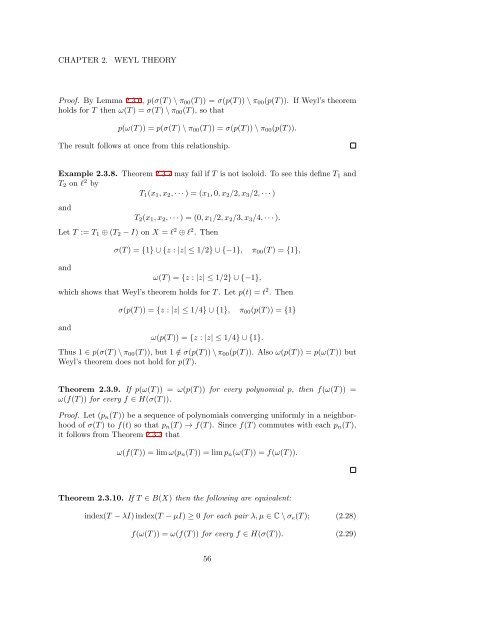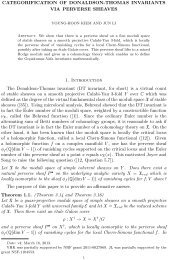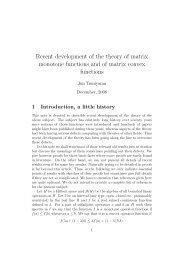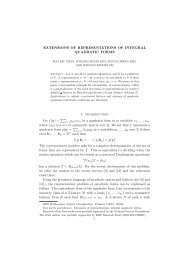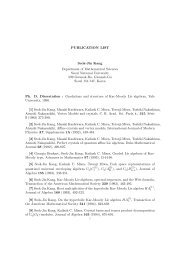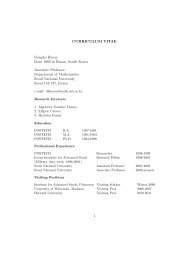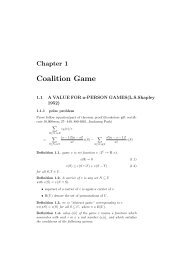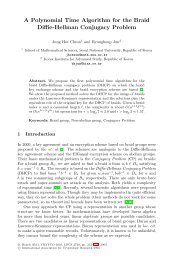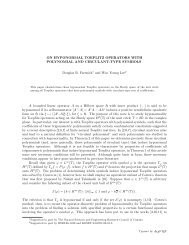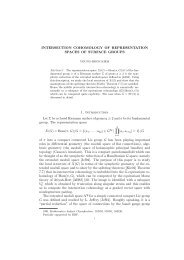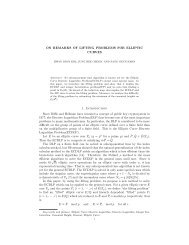Woo Young Lee Lecture Notes on Operator Theory
Woo Young Lee Lecture Notes on Operator Theory
Woo Young Lee Lecture Notes on Operator Theory
You also want an ePaper? Increase the reach of your titles
YUMPU automatically turns print PDFs into web optimized ePapers that Google loves.
CHAPTER 2.<br />
WEYL THEORY<br />
Proof. By Lemma 2.3.6, p(σ(T ) \ π 00 (T )) = σ(p(T )) \ π 00 (p(T )). If Weyl’s theorem<br />
holds for T then ω(T ) = σ(T ) \ π 00 (T ), so that<br />
p(ω(T )) = p(σ(T ) \ π 00 (T )) = σ(p(T )) \ π 00 (p(T )).<br />
The result follows at <strong>on</strong>ce from this relati<strong>on</strong>ship.<br />
Example 2.3.8. Theorem 2.3.7 may fail if T is not isoloid. To see this define T 1 and<br />
T 2 <strong>on</strong> l 2 by<br />
T 1 (x 1 , x 2 , · · · ) = (x 1 , 0, x 2 /2, x 3 /2, · · · )<br />
and<br />
T 2 (x 1 , x 2 , · · · ) = (0, x 1 /2, x 2 /3, x 3 /4, · · · ).<br />
Let T := T 1 ⊕ (T 2 − I) <strong>on</strong> X = l 2 ⊕ l 2 . Then<br />
and<br />
σ(T ) = {1} ∪ {z : |z| ≤ 1/2} ∪ {−1}, π 00 (T ) = {1},<br />
ω(T ) = {z : |z| ≤ 1/2} ∪ {−1},<br />
which shows that Weyl’s theorem holds for T . Let p(t) = t 2 . Then<br />
and<br />
σ(p(T )) = {z : |z| ≤ 1/4} ∪ {1}, π 00 (p(T )) = {1}<br />
ω(p(T )) = {z : |z| ≤ 1/4} ∪ {1}.<br />
Thus 1 ∈ p(σ(T ) \ π 00 (T )), but 1 /∈ σ(p(T )) \ π 00 (p(T )). Also ω(p(T )) = p(ω(T )) but<br />
Weyl’s theorem does not hold for p(T ).<br />
Theorem 2.3.9. If p(ω(T )) = ω(p(T )) for every polynomial p, then f(ω(T )) =<br />
ω(f(T )) for every f ∈ H(σ(T )).<br />
Proof. Let (p n (T )) be a sequence of polynomials c<strong>on</strong>verging uniformly in a neighborhood<br />
of σ(T ) to f(t) so that p n (T ) → f(T ). Since f(T ) commutes with each p n (T ),<br />
it follows from Theorem 2.3.3 that<br />
ω(f(T )) = lim ω(p n (T )) = lim p n (ω(T )) = f(ω(T )).<br />
Theorem 2.3.10. If T ∈ B(X) then the following are equivalent:<br />
index(T − λI) index(T − µI) ≥ 0 for each pair λ, µ ∈ C \ σ e (T ); (2.28)<br />
f(ω(T )) = ω(f(T )) for every f ∈ H(σ(T )). (2.29)<br />
56


